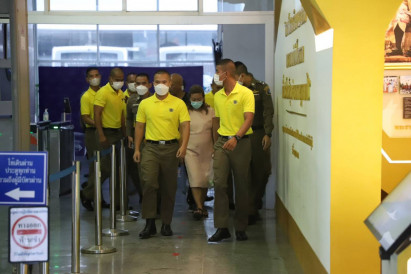
Police are following the money trail of Sararat “Am” Rangsiwuthaporn, a suspected serial murderer, after a review of bank accounts revealed that as many as 20 people died after transferring large sums to her over the past two years.
A source close to the police said investigators were widening the probe into the mystery deaths of 13 people linked to Ms Sararat. One person survived a suspected poisoning attempt.
A few days ago, investigators obtained crucial evidence suggesting that the number of reported dead victims might be higher than currently believed.
A review of the suspect’s bank accounts from 2021 to the present showed that many people had transferred money to Ms Sararat, with amounts ranging from 10,000 to hundreds of thousands of baht.
Among those people, 18 to 20 had died after money transfers were made. The deceased included the 13 who have already been identified as possible victims, said the source. Police are now looking into the causes of death of the other five to seven people.
Police have obtained substantial evidence that could implicate Ms Sararat in the one murder with which she is already charged, said Pol Col Anek Taosupap, the deputy commander of the Crime Suppression Division (CSD).
Ms Sararat, 36, the ex-wife of a senior police officer in Ratchaburi, was arrested on Tuesday at the government complex on Chaeng Watthana Road in Bangkok on a warrant issued by the Criminal Court.
Her arrest followed a complaint filed by the mother and elder sister of the late Siriporn “Koy” Khanwong, 32, of Kanchanaburi. Siriporn collapsed and died on the bank of the Mae Klong river in Ban Pong district of Ratchaburi, where she had gone with Ms Sararat to release fish for merit-making on April 14. Cyanide was found in her body.
Investigators came to believe that Ms Sararat might have mixed cyanide in Siriporn’s food, causing her death. She allegedly also stole the victim’s valuables.
CSD investigators called Raphee Chamnarnrue, who took the family of the dead woman to file the police complaint, to give his statement as a witness on Saturday as they wanted further details, said Pol Col Anek.
On Sunday, investigators plan to question a nurse at Taksin Hospital who was a close friend of Ms Sararat and member of the same pyramid scheme, he said. He gave her name only as “Nok”.
Ms Sararat, who is four months pregnant, is currently being detained at the Central Women’s Correctional Institute. (Story continues below)

Raphee Chamnarnrue, a community volunteer who has been helping the families of people suspected as having died at the hands of a serial killer, talks with reporters at the Central Investigation Bureau on Saturday. (Photo supplied/Wassayos Ngamkham)
Police investigation teams have fanned out across Ratchaburi, Kanchanaburi, Nakhon Pathom and Phetchaburi provinces in search of more clues in the case.
The number of suspected deaths rose to 13 on Friday with the naming of Sawittree “Nim” Budsrirak, 41, who died in 2020 in Mukdahan, said Pol Gen Surachate Hakparn, the deputy national police chief.
According to her husband, Pol Snr Sgt Maj Nithipon Nuchid, Sawittree knew Ms Sararat through money lending and a pyramid scheme business and owed her at least 100,000 baht.
His wife died after taking a “diet pill” that Ms Sararat allegedly sent to her. The autopsy results showed a high amount of potassium in her bloodstream, he said.
Meanwhile, Mr Raphee arrived at the Central Investigation Bureau headquarters on Saturday to give his statement to CSD investigators about the death of Siriporn.
A volunteer in Kanchanaburi who has brought other cases to police attention in the past, he told reporters that he had been contacted by relatives of Siriporn as they had lingering doubts over the cause of her death.
He began looking into the case and gathering evidence that police might be able to use. There were witnesses who knew that Ms Sararat had phoned Siriporn to ask her to release fish into the Mae Klong River. He also had security video showing the two women together in a car on the day that Siriporn died.
Commenting on reports that as many as 30 people might have fallen victim to the suspect, Mr Raphee said those reports had to be double-checked. He had received information about other possible victims but after checking them he found many were not linked.
There were two cases in Nakhon Pathom in which the victims were involved in money lending and a pyramid scheme. Forensic officers had examined the bodies, he said.
He declined to elaborate on whether they had been poisoned, saying he had coordinated with their relatives to give information to Pol Gen Surachate.
Forensic investigation
Meanwhile, forensic investigations are continuing, with traces of cyanide found on the right console of the black Honda Civic Ms Sararat and her ex-husband used to drive, according to Weerachai Phutdhawong, an associate professor of chemistry at Kasetsart University. More traces were found in a bronze Toyota Vios that the suspect was driving on the day that Siriporn died.
A source close to the investigation said earlier that Ms Sararat had reportedly purchased cyanide online. Cyanide is a controlled substance used in industries and cannot be purchased at drug stores.
Questions have also arisen about the death of Ms Sararat’s boyfriend, Sutthisak “Dae” Phoonkhwan, with whom she began a relationship after divorcing her police husband last year.
Sutthisak, 35, died on March 12 this year in Udon Thani. He passed out at a petrol station in Nong Han district of the northeastern province after making merit with Ms Sararat at a local temple and having meals at a restaurant. Rescue workers rushed him to Nong Han Hospital. He was treated there and later discharged.
However, he died later the same day at a dormitory in Muang district of the northeastern province.

Forensic officers examine a car used by murder suspect Sararat Rangsiwuthaporn for possible evidence about cyanide. (Photo supplied/Wassayos Ngamkham)

